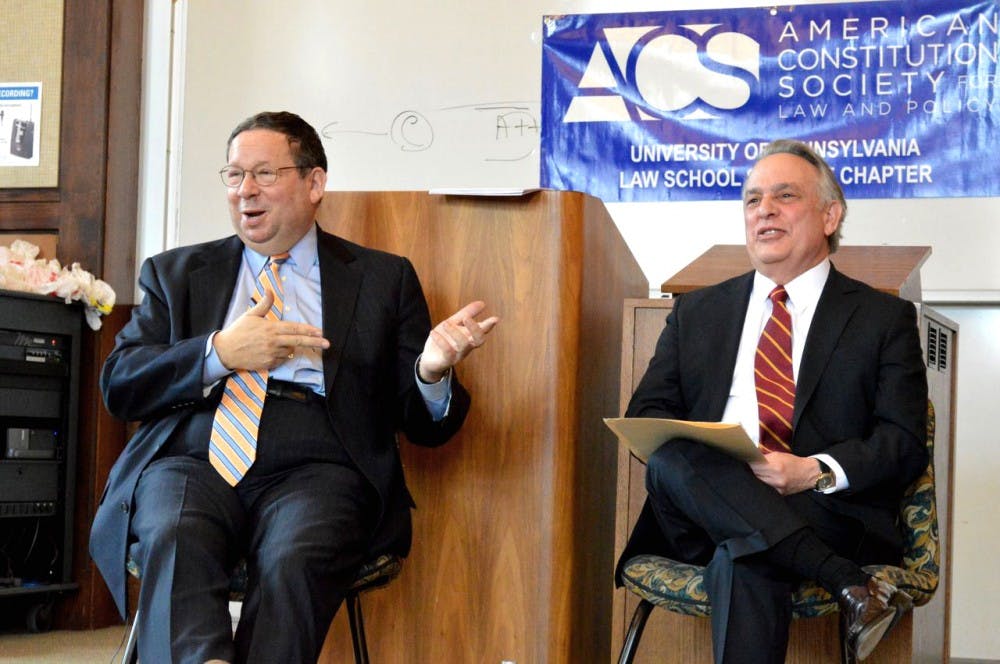The Greater Philadelphia Chamber of Commerce — a private lobbying group for which Penn is one of seven “sustaining investors” — is suing Philadelphia over a law designed to promote fair pay.
The lawsuit’s main proponent is reportedly Penn Board of Trustees Chair David Cohen.
Philadelphia’s latest pay equity statute prohibits employers from asking for an applicant’s wage history, a practice shown to adversely affect the salaries of women and people of color. Although passed by a unanimous vote in December and originally scheduled to take effect May 23, the law has sparked strong resistance from the chamber and is now in suspension pending litigation.
“In its current form, the ordinance will not advance gender wage equality, but instead will chill the protected speech of employers and immeasurably complicate their task of making informed hiring decisions,” the Chamber said in an April 6 court filing for its lawsuit asking for an injunction to prevent Philadelphia from implementing the bill.
The chamber’s prosecuting attorney, Miguel Estrada, previously used this argument on behalf of Comcast, another one of the chamber’s “sustaining investors.” In a January memo obtained by The Philadelphia Inquirer, Estrada said Comcast would sue the city for violating First Amendment rights, unless Mayor Jim Kenney, a former Penn instructor, vetoed the law.
Cohen, a 1981 Penn Law School graduate, is a high-ranking executive at both Comcast and the Chamber of Commerce.
At Comcast, he is the senior executive vice president, chief diversity officer and a senior counselor to the CEO. In these positions, Cohen “oversees Comcast’s robust lobbying operation,” according to a 2014 profile in The New York Times.
At the Chamber, Cohen is on the executive committee, a group that also includes Penn President Amy Gutmann. As a member of the chamber’s executive committee, Cohen voted in favor of filing the lawsuit.
Sources who have spoken with members of the executive committee said Gutmann was not present for the vote.
The law’s sponsor, City Councilman Bill Greenlee, met with Cohen about the wage discrimination law in January, alongside chamber CEO Rob Wonderling and Drexel University President John Fry, who chairs the chamber’s executive committee. Greenlee said Cohen was “clearly the leader and the lead spokesperson” of the group that day and was the law’s most vocal opponent.
“People who are all familiar with the inner workings of the Chamber say that Cohen is the leading influence [on the executive committee],” Greenlee said. “And certainly on the issue of the lawsuit, he was the main voice.”
Greenlee added that Cohen himself had admitted that wage inequity is a problem in Philadelphia.
Cohen deferred all comment on the lawsuit to the Chamber of Commerce. In an emailed statement, the chamber said it believes the law “violates employers’ First Amendment rights by prohibiting them from asking about wage history,” and acts “as a broad impediment to business.”
Greenlee said Cohen’s strong resistance to the lawsuit “certainly raises the question” of whether his response was influenced by his commitments to the University and Comcast, which are the city’s largest and third largest employers respectively, according to Philadelphia Business Journal.
As chair of the Board of Trustees, Cohen bears many responsibilities to the University. He appoints members of Penn’s Investment Board; acts as a member of Penn’s Medicine Board and Executive Team; oversees “general policies” for faculty qualification and heads the committee that determines Gutmann’s yearly compensation.
“This lawsuit sounds to me like it’s trying to advance the University’s interests, because the University or Comcast would like to pay people as little as it can, and if you know what [an employee’s] earned in the past, you get a sense of how low you can go,” Penn Law professor Kermit Roosevelt said. “So it doesn’t seem like [promoting the lawsuit] would be contrary to fiduciary duties.”
Fiduciary duties, Roosevelt said, would require members on institutions like the Board of Trustees to work to advance the interests of the University.
Roosevelt also questioned the legal merits of the chamber suing on the grounds of free speech.
“I think [the lawsuit] is an example of what we’ve been seeing recently, of businesses using the First Amendment as a deregulatory device,” Roosevelt said. “But what the [law] is about is to prevent discrimination based on prior earnings. That does not implicate any sort of core purpose of the First Amendment.”
Even if Greenlee’s legislation survives the Chamber’s lawsuit, further challenges may lie ahead.
The Pennsylvania State Senate passed a bill in February that, if ratified, would supersede all municipal pay equity ordinances, including Philadelphia’s wage-history discrimination law.
The bill’s sponsor, state Sen. Thomas McGarrigle, received a $5,000 donation from Comcast during his last election campaign.









